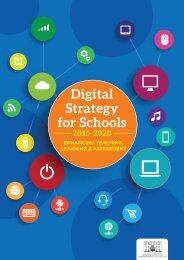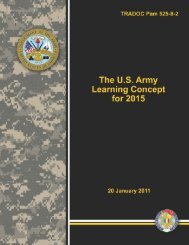Digital Strategy for Schools
TKmc0
TKmc0
Create successful ePaper yourself
Turn your PDF publications into a flip-book with our unique Google optimized e-Paper software.
DIGITAL STRATEGY FOR SCHOOLS – ENHANCING TEACHING, LEARNING & ASSESSMENT<br />
The framework is comprised of six aspects of a learning system, and it “provides a lens to<br />
conceptualise what being digital in learning can look like” (Ibid; p.2), as depicted in Figure 3 below.<br />
FIGURE 3: THE UNESCO ICT COMPETENCY FRAMEWORK FOR TEACHERS<br />
UNDERSTANDING<br />
ICT IN EDUCATION<br />
CURRICULUM AND<br />
ASSESSMENT<br />
TECHNOLOGY<br />
LITERACY<br />
KNOWLEDGE<br />
DEEPENING<br />
KNOWLEDGE<br />
CREATION<br />
Policy awareness Policy understanding Policy innovation<br />
Basic knowledge Knowledge application Knowledge society<br />
skills<br />
PEDAGOGY Integrate technology Complex problem<br />
solving<br />
Self management<br />
ICT Basic tools Complex tools Pervasive tools<br />
ORGANISATION AND<br />
ADMINISTRATION<br />
TEACHER<br />
PROFESSIONAL<br />
LEARNING<br />
Standard classroom Collaborative groups Learning organisations<br />
<strong>Digital</strong> literacy Manage and guide Teacher as model<br />
learner<br />
The UNESCO ICT Competency Framework 25 provides a lens <strong>for</strong> monitoring how ICT can support<br />
such trans<strong>for</strong>mation in schools. The framework identifies three complementary and overlapping<br />
approaches connecting education policy with economic and social development through the use of<br />
ICT. These approaches are defined as technology literacy, knowledge deepening and knowledge<br />
creation. The three approaches are described as follows:<br />
• Increasing the extent to which new technology is used by students, citizens and the work<strong>for</strong>ce by<br />
incorporating technology skills into the school curriculum — the Technology Literacy approach.<br />
• Increasing the ability of students, citizens, and the work<strong>for</strong>ce to use knowledge to add value to<br />
society and the economy by applying it to solve complex, real-world problems — the Knowledge<br />
Deepening approach.<br />
• Increasing the ability of students, citizens, and the work<strong>for</strong>ce to innovate, produce new<br />
knowledge, and benefit from this new knowledge — the Knowledge Creation approach.<br />
(UNESCO, 2011; p.7).<br />
Viewed in this way, ICT can help trans<strong>for</strong>m all aspects of education, particularly at primary and postprimary<br />
level.<br />
Utilising the ICT Competency Framework<br />
The ICT Competency Framework is a useful way to gauge what has been accomplished in Ireland<br />
25<br />
UNECSO ICT Competency Framework <strong>for</strong> Teachers (http://unesdoc.unesco.org/images/0021/002134/213475e.pdf)<br />
20




